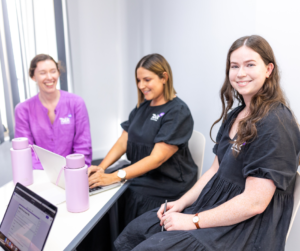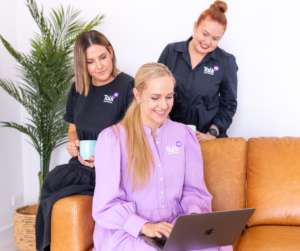Are you struggling to get your child to eat a variety of foods? TalkHQ’s Fun with Food group therapy is an intensive therapy program that can help. Our program helps children to tolerate different textures and expand their food range. This group aims to improve their food tolerances to improve the child’s nutrition and overall health. We know how important it is for kids to have a healthy diet. This is why we want to help as many kids as possible learn how to enjoy food. With our program, your child will learn to try new foods and develop a healthier relationship with food.
Want to learn more? This blog will explain what this group is about, who it is most suitable for and why it benefits these clients. I will also address some of our FAQs that we get asked!
What is Fun with food?
Fun with food group is a play-based program to teach children the skills they need in order to eat a wide variety of food types and textures using the natural, social reinforcement of playing with the food and interacting with adults and peers.
The Sequential Oral Sensory (SOS) approach to feeding is a nationally and internationally recognized specialized feeding intervention that has 30 years of evidence-based development. The program is designed to help all children develop healthy, enjoyable, relationships with food. The SOS Approach slowly uses gradual desensitisation to introduce new foods in a structured hierarchy. The group setting can be really useful to support children to progress with their eating and drinking goals. It also helps develop their oro-motor skills, and introduce new foods. The skills learnt in the group are transferrable to home and school.
Food aversion can be a common problem for parents of young children. While it can be frustrating to deal with, it’s important to remember that sensory issues are often at play. For many kids, certain textures, smells, and tastes can be overpowering and off-putting. As a result, they may refuse to eat certain foods or only eat a very limited range of foods. This is challenging for parents. Working with your child’s sensory issues is important rather than against them. The Fun With Food program helps overcome restricted eating habits.
Why are some kids “picky” eaters?
Typically, kids don’t choose to be picky eaters. This is why we avoid using this descriptive label. It is suggestive that it is a choice or behaviour. Sometimes, there is a medical reason for specific food aversions such as cleft repairs, low tone, or a history of feeding tubes when young. Sometimes, there is a psychological fear of choking. Other times, food aversion is due to oral sensory issues. Reduced tolerances of foods will often co-occur with neurodiversity. Neurodiverse kids often present with sensory issues that make everyday activities, such as eating, difficult. Many of these children have oral sensitivities that makes eating certain foods unbearable. In many cases, simply increasing the child’s oral sensory awareness can help to reduce the discomfort. By working with a qualified speech pathologist and/or occupational therapist, many neurodiverse kids can learn to overcome their oral sensitivities and enjoy a more varied diet.
The 6 steps of eating
Eating is something that most of us do multiple times a day, but have you ever stopped to think about all the steps your body has to go through just to eat? It’s amazing when you break it down! The process of eating can be broken down into six major steps, and it doesn’t begin at the mouth.
The first step is tolerating the physical presence or look of the food. This might even include just being in the same room as the food. Then, perhaps, we can interact with the food without directly touching it. Next, our body needs to process the smell of food. The interaction then expands to include touching the food with your fingers, hands, body, and mouth. Tasting comes next as we put small amounts of food in our mouths to see if we like the flavour. Finally, once we’ve decided that we like the food, we start eating it earnestly. This is a lot of information for our bodies to take in, and it all happens before the first bite. So the next time you’re sitting down to a meal, take a moment to appreciate all the steps your orally-sensitive child takes just to eat particular foods.
Who suits the Fun With Food group?
The Fun With Food group therapy is suitable for children who:
- are aged 4 to 7 years
- have a limited food range
- can follow instructions
- can play in a small group setting
Please note: Due to the nature of the group, clients may need to be screened for suitability by the therapist with a mealtime observation/assessment before attendance is confirmed.
Benefits of Therapy?
While some children are naturally adventurous eaters, others can be quite uncertain when it comes to new foods. If your child falls into the latter category, you may be wondering if therapy could help. And the answer is yes! Here are a few ways that speech pathology and other types of therapy can help fussy eaters improve their nutrition, moods, and energy levels.
One of the main benefits of therapy is that it can help fussy eaters identify and overcome any sensory issues they may have with certain foods. For example, a child who is sensitive to textures may benefit from therapy to help them learn to tolerate different textures in their food. Speech pathology can also be helpful in teaching children how to properly chew and swallow their food. Once any sensory issues have been addressed, children can start to expand their diets and get the nutrients they need.
In addition to improved nutrition, another benefit of therapy for these children is that it can lead to better moods. Children who are well-nourished tend to have more energy and feel happier overall. With this group therapy program, children with food aversions can learn how to cope with their sensory eating habits in a healthy way. This can lead to increased positive interactions around mealtimes. As they increase their variety of foods, families find they can go to cafes, restaurants, birthday parties etc. Parents don’t have to stress about bringing their own food, and children feel more included.
What’s involved in the group?
Each of our groups runs for 2x 1-hour sessions each day for 4 days. It is important that your child attends each session of the group. It is intensive because this is what is required to build up your child’s tolerance.
Do parents sit in the sessions as well?
Parents will wait in the reception. At the 50-minute mark, the speech pathologist will bring the children out to the parents and explain what was covered in the group. Because of confidentiality, specific feedback about your child’s performances is shared via the See Saw app. This is a REALLY important feature of the groups. A big component of speech pathology is coaching parents (and kids) on how to use particular techniques to help build and strengthen specific skills. These ten-minute daily tricks/tips in the family home make a world of difference to your child’s tolerances.
How many children are in each group?
We only allow 3-4 children per group to maximise learning.
How do I enrol in the groups?
Contact Us here and our support services team will be in touch to add your child to the group. Alternatively, click this LINK and you will be taken to our online booking system. and you can select the location and time that suits you. For private paying clients, we require a deposit of $96. Once enrolled in the group, we will send you a confirmation email, case history and payment details.
What if the groups are already full?
You can register your expression of interest. We will contact you when the next round of groups becomes available. To ensure your child’s place, we recommend paying a deposit.
How much does group therapy cost?
Each session costs $96. This includes a $10 non-refundable administration fee.
How much is the deposit?
The deposit is $96, payable at the time of booking. NDIA-funded clients will need to submit a completed service agreement to secure their child’s place.
What if my child can’t attend the group?
We understand that life happens and plans can suddenly change. You must contact us to let us know you cannot attend. Your child can attend a group at a later date.
If you are no longer interested in attending the groups, you will receive a refund of $86.







